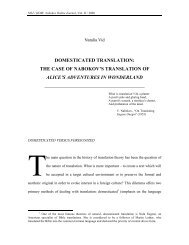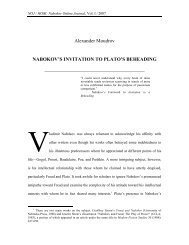Create successful ePaper yourself
Turn your PDF publications into a flip-book with our unique Google optimized e-Paper software.
Nabokov Online Journal, Vol. V (2011)<br />
_______________________________________________________________________<br />
the same token, to redeem and resurrect, Lolita; and the same goes for Nabokov and his<br />
aesthetic project.<br />
Several reviewers of Lo’s Diary suggested that a sexually ravenous, dirty-talking<br />
Lo, one who is not used by Humbert but herself does the using, is unbelievable and thus<br />
aesthetically unmotivated. But this objection is beside the point; I would stress rather that<br />
such constant attention to sexual matters, to the life of, as Bakhtin has it, the “lower body<br />
stratum,” is a weapon in Pera’s ideological assault upon aestheticism. Let us recall the<br />
foregrounding of the body in the Bakhtinian interpretation of the medieval carnival. 22 In<br />
the culture of the marketplace, the body’s centrality “is opposed to severance from the<br />
material and bodily roots of the world; it makes no pretense to renunciation of the earthy,<br />
or independence of the earth and the body” (Bakhtin 19). The sublimation of the bodily to<br />
which Bakhtin here alludes is part of the mechanism by which ecclesiastical authority<br />
and social hierarchy established themselves: those who were in charge of their own<br />
physical nature laid claim to control those who were not, who still resided in a natural<br />
state. The carnival focus on the body represents a return to the universal and natural as<br />
opposed to the socially-constructed and hierarchical: “[T]he body and bodily life have<br />
here a cosmic and at the same time an all-people’s character; this is not the body and its<br />
physiology in the modern sense of these words, because it is not individualized” (Bakhtin<br />
19). Pera’s subversion-via-vulgarity assault upon Nabokov’s authorial domination, then,<br />
proceeds much as, in Pierre Bourdieu’s interpretation of Bakhtin, the carnivalesque<br />
popular imagination reacts against social elites with “a strategy of reduction or<br />
degradation, as in slang, parody, burlesque or caricature, using obscenity or scatology to<br />
turn arsy-versy, head over heels, all the ‘values’ in which the dominant groups project<br />
and recognize their sublimity … reduc[ing] the distinctive pleasures of the soul to the<br />
common satisfactions of food and sex” (Bourdieu 491). The insertion, in Lo's Diary, of<br />
painfully specific descriptions of Lolita’s sexual life into Nabokov's plot represents a<br />
reinstatement of the triumphant natural, its escape from the artful control of the original<br />
author; Pera's is a rebellion against Nabokov's claim to creative authority and an attempt<br />
22 My comparison of Pera’s use of the body to the role of corporeality in marketplace culture was inspired<br />
by Hutcheon’s discussion of the similarities between modern metafiction and Bakhtinian carnival parody<br />
(72).<br />
16

















